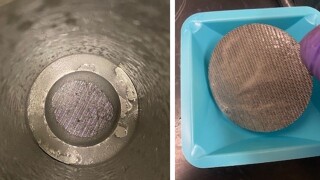Drilling/completion fluids
Two critical facets of the discipline of well control and wellbore integrity—decarbonization and groundbreaking automation of essential processes—are highlighted in the three primary paper selections presented at SPE and SPE-affiliated conferences during the past year.
This research aims to develop a fluid-advisory system that provides recommendations for optimal amounts of chemical additives needed to maintain desired fluid properties in various drilling-fluid systems.
This paper describes development of a high-temperature water-based reservoir drill-in fluid using a novel synthetic polymer and customized with optimal chemical concentrations and sized calcium carbonate.
-
This paper examines the chemistry of developing seawater-based fracturing fluids using two types of polymers as gelling agents and compares results to existing fresh-water-based-fracturing-fluid data under different conditions.
-
Always recorded but almost never used, the water hammer signal could offer completions engineers another set of insightful data if petroleum engineers can crack its code.
-
For nanotechnology-based drilling fluids, acceptance means proving they can outperform other drilling fluids. Initial results have been encouraging enough to move toward commercialization.
-
With shrinking budgets and limited resources, partnerships and collaboration are considered the best options. It is no secret that universities and industry have a special platform to work hand-in-hand.
-
The wireline formation tester (WFT) is a well-developed technology used to collect representative downhole fluid samples. The authors introduce a simple but effective method for monitoring WFT sampling when targeting the low levels of contamination needed for asphaltene-onset-pressure analysis.
-
This work focuses on the laboratory techniques for developing, assessing, and analyzing innovative water-based drilling fluids containing iron oxide (Fe2O3) and silica (SiO2) nanoparticles.
-
At certain conditions, the good performance of synthetic-based mud (SBM) will degrade, particularly because of the effect of chemical instability under high temperature. Silicon dioxide (SiO2) nanopowder (nanosilica) holds the potential for performance improvement.
-
A long-time energy industry executive and chemical engineer has built a new water treatment system that he says can increase recovery rates from shale wells without using chemicals and will recycle all the water used in the process.
-
The inventor of a new water-based drilling fluid believes the chemical process involved with his technology opens up natural fractures as drilling takes place to increase production in shale formations.
-
A challenge in many permeable, water-sensitive, subhydrostatic reservoirs is avoiding the loss of completion fluid when completing or working over wells.













